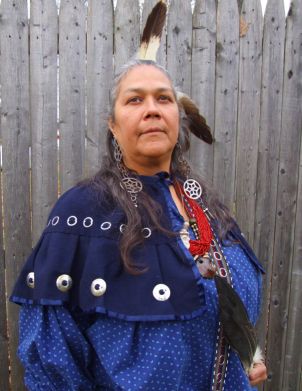 |
Canku Ota
|
 |
|
(Many Paths)
|
||
|
An Online Newsletter
Celebrating Native America
|
||
|
September 1, 2010 -
Volume 8 Number 9
|
||
|
|
||
|
Local Tribal Member
To Receive 2010 Michigan Heritage Award For Her Life Long Work In
Basketry, Finger Weaving And Other Natural Fiber Art Traditions
|
||
|
by Christina Rohn -
Petoskey (MI) News-Review Staff Writer
|
||
|
Little Traverse Bay Bands of Odawa Indians tribal member Dillard, 47, of Harbor Springs, is about to be honored Saturday, Aug. 14, during the Great Lakes Folk Festival in Lansing, as one of four 2010 Michigan Heritage Award Winners, for her lifelong work and perpetuation of black ash basketry, finger weaving and other natural fiber arts traditions. Dillard said it was her parents' influence that led her to discover her talents in finger weaving and basketry, but she says it took a couple of twists and turns to get there. "I was about 8 or 9 years old and my parents tried me at leather work, bead work ... all different mediums of traditional artwork, and I didn't excel at any of those," she said. "But, my father (Isaac Peters) kept insisting that I had a special talent." It wasn't until later that Dillard watched her Scottish mother, Mae Louise Ring, finger weaving, that she began to develop an interest in the art form. "I would stand over her shoulder and I'd just watched her fingers weave, and I said, 'I can do that,' and she said, 'Let's see.'" Dillard hasn't stopped since. She says finger weaving and basketry have allowed her to connect with ancestors who have walked on. "When I'm finger weaving, making those motions is all about emotion ... my body is moving in the same way my ancestors' bodies moved," she said. "When I turn cattails (which are woven into mats), to make sure they're dry, I believe it calls my ancestors to see who's doing that again. "There's a certain sense of connectedness when I do these things — that drives me." Another thing that drives Dillard is her passion to pass these talents and skills onto the younger generation. "My mother told me this information does not belong to me, it belongs to the Anishinabe people," Dillard said. "It's my journey to re-teach our people these ways ... I must help people realize our past so we can see our tomorrow." About eight years ago Dillard and her husband, 56-year-old Edward Peterson, quit their day jobs with the Saginaw Chippewa Indian Tribe and began working together on black ash basketry, as well as educating those around them about the ancient tradition. "Weaving is very, very easy — it's about 25 percent of the work," Dillard said. "It's getting the (black ash) tree into weavable material that's the difficult process." Dillard and Peterson go through a lengthy process annually that involves walking into swamps and thick brush to collect black ash trees for their basketry. While in the woods they go through an ancient ceremony that involves prayer and tobacco before harvesting. Once they bring the trees home, the labor-intensive work begins, which includes shaving the bark with a knife, pounding splints, pulling strips from the tree and shaving the splints of wood into smooth, weavable material. "It's hard, hard work," Dillard said. Dillard and her husband travel throughout the United States and Canada to powwows, art shows, museums, colleges, high schools, junior high schools and elementary schools to demonstrate or teach their artistry to others. When Dillard is home in Harbor Springs, she teaches only the most eager tribal members black ash basketry. "I teach them to fish ... I take them out into the bush," she said. "It's so labor intensive; they have to really enjoy it." Dillard, who will be presented a Michigan Heritage Award this Saturday, said she was surprised when she learned of the accolade. "I didn't know how prestigious it was until I looked online and I went, 'Oh, whoa,'" she said. "It's nice to be recognized for your accomplishments. "It feels good that people from other communities see the work you put in to carry on these laborious traditions." To learn more about Dillard's artwork, or to purchase some of her goods, call (231) 242-0408, or e-mail her at lightallaround@yahoo.com. |
|
|
||
|
|
||
| Canku Ota is a free Newsletter celebrating Native America, its traditions and accomplishments . We do not provide subscriber or visitor names to anyone. Some articles presented in Canku Ota may contain copyright material. We have received appropriate permissions for republishing any articles. Material appearing here is distributed without profit or monetary gain to those who have expressed an interest. This is in accordance with Title 17 U.S.C. Section 107. | ||
|
Canku Ota is a copyright ©
2000, 2001, 2002, 2003, 2004, 2005, 2006, 2007, 2008, 2009, 2010
of Vicki Barry and Paul Barry.
|
||
 |
 |
|
|
The "Canku
Ota - A Newsletter Celebrating Native America" web site and
its design is the
|
||
|
Copyright ©
1999, 2000, 2001, 2002, 2003, 2004, 2005,
2006, 2007, 2008, 2009, 2010
of Paul C. Barry.
|
||
|
All Rights Reserved.
|
||
 Renee
Wasson Dillard considers herself a "culture bearer" —
someone who is passing down Native American traditions for generations
to come.
Renee
Wasson Dillard considers herself a "culture bearer" —
someone who is passing down Native American traditions for generations
to come.